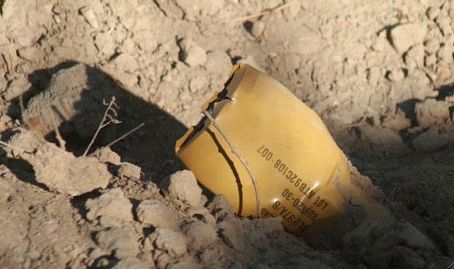By Dave Lindorff

Unexploded US cluster bomb in Afghanistan waits for child (
(Image by ThisCantBeHappening!)) Details DMCA
Syrian civilians and children should count themselves lucky that mass opposition in the US, the UK and much of the rest of the world to the idea of a US bombing blitz aimed at punishing the Syrian government for allegedly using Sarin gas in an attack on a Damascus neighborhood forced the US to back off and accept a Russian deal to get rid of Syria's chemical weapons.
Had the US attacked, primarily with a two- or three-day barrage of Tomahawk missiles, many of those rockets would likely have carried warheads containing BLU-97 cluster munitions, according to the United States Campaign to Ban Cluster Munitions.
This news should come as no surprise. The US made heavy use of deadly body-shredding cluster munitions in its invasion of Iraq in 2003 and during the subsequent bloody war and occupation there, as well as in its invasion of Afghanistan in 2001. Some 30 tons of cluster bombs were dropped or fired into urban neighborhoods of Iraq during the 2003 US invasion of that country. Another 250,000 antipersonnel bomblets were dropped or fired into Afghani neighborhoods during the 2001-2 US invasion of that country.
The US Campaign to Ban Cluster Munitions notes that the last documented US use of cluster munitions was in 2009. The organization writes that was:
"...in Yemen, when one or more Tomahawk cruise missiles loaded with BLU-97 bomblets struck the hamlet of al-Majala in the southern Abyan province. The strike killed at least 41 civilians and at least four more civilians were killed and 13 wounded by unexploded bomblets after the attack. Four years later, the site of the attack remains contaminated by cluster munition remnants."
In fact, cluster weapons, whether bombs dropped from planes, warheads fired by missiles, or shells fired by cannons or tanks, are among the deadliest and most untargetable weapons devised by man, holding the distinction of being particularly lethal to civilians and children. They work by having a larger bomb, warhead or shell deliver a payload of smaller "bomblets" to a target (each Tomahawk cluster warhead contains 166 of the lethal bomblets). These casings burst open, releasing the small devices, either on the ground, or lowered by little parachutes. Many burst on impact, sending small deadly spinning flechettes out in all directions to tear the flesh off of bones, maiming and killing anyone in the vicinity, while others routinely fail to explode, and then lie around, sometimes for years, until someone steps on one, or a child picks it up to see what it is. (Unexploded BLU-97s look like cardboard drink containers and are bright orange.)...
For the rest of this article by DAVE LINDORFF in ThisCantBeHappening!, the new uncompromising three-time Project Censored Award-winning online alternative newspaper, please go to: www.thiscantbehappening.





